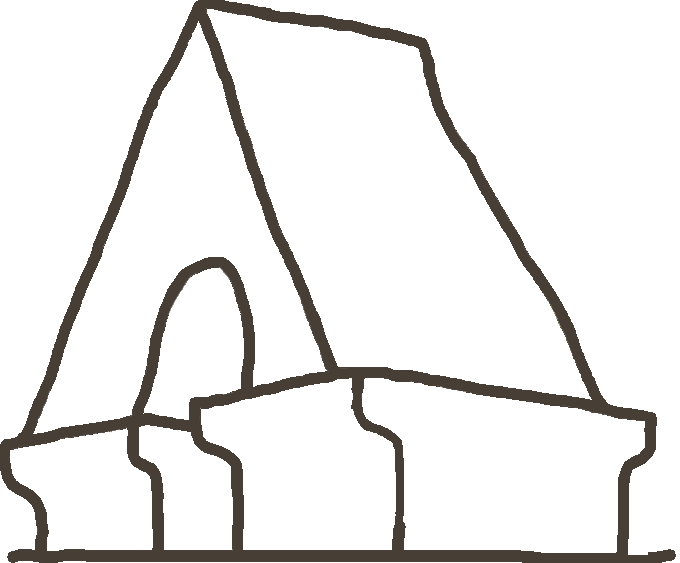https://youtu.be/J8Ew576HdVE
Born in Bari, Armando Perotti was a writer, a poet, a journalist.
Great lover of art and history, he had a very important role in the Apulian cultural life at the beginning of the last century. He strongly supported a unitary idea of the Apulian region, enhanced with his studies, in his writings, in his time spent across Apulia in Castro, Bari, Cassano Murge and Bisceglie.
Here he met and got married to Fortunata Consiglio, the woman to whom he sent, during the courtship and marriage years, beautiful postcards representing a fascinating insight into the Apulian life and landscape at the beginning of the 1900s.
He lived with Fortunata in their family mansion at Bisceglie, spending their summertime in the countryside at Posta Santa Croce, whose property was already more than a century owned by the Consiglio family.
We pay tribute to him on this page, by publishing, in the video at the top some postcards and extracts of the lovely words he used to say about our region, from his book “Storie e storielle di Puglia”, published by Laterza.
Here is the Wikipedia page dedicated to him:
For this anniversary, the National Library of Bari dedicated an exhibition to him. Here is the link to the website of the Ministry of Culture, that is promoting it:
La Biblioteca Nazionale di Bari per i 100 anni dalla morte di Armando Perotti
The Municipality of Cassano Murge published some videos in which his sonnets about the months are declaimed. Here are some of them:
Some of his publications have been digitized and made available on the web:
https://archive.org/details/perotti-storie-storielle-di-puglia/page/10/mode/2up
https://archive.org/details/perotti-poesie
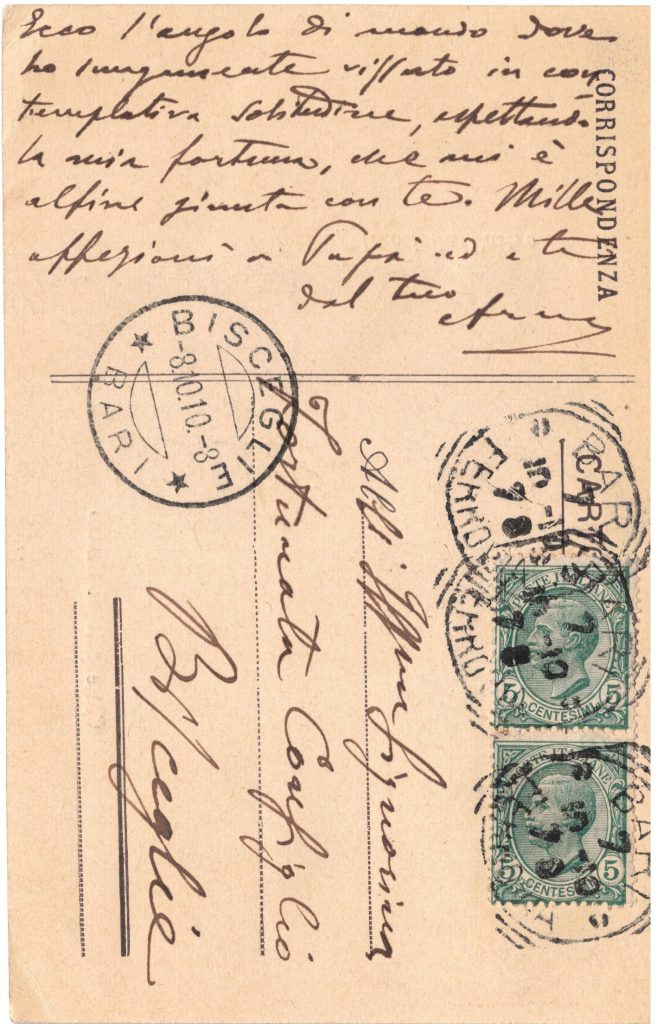
Castro, the corner of his world
“Here is the corner of the world“, he wrote to Fortunata Consiglio, playing with her name, “Where I’ve unpunished lived in contemplative solitude, waiting for my fortune, finally come to me with you“.
The corner of the world is the sea of Castro, pictured in the postcard image:
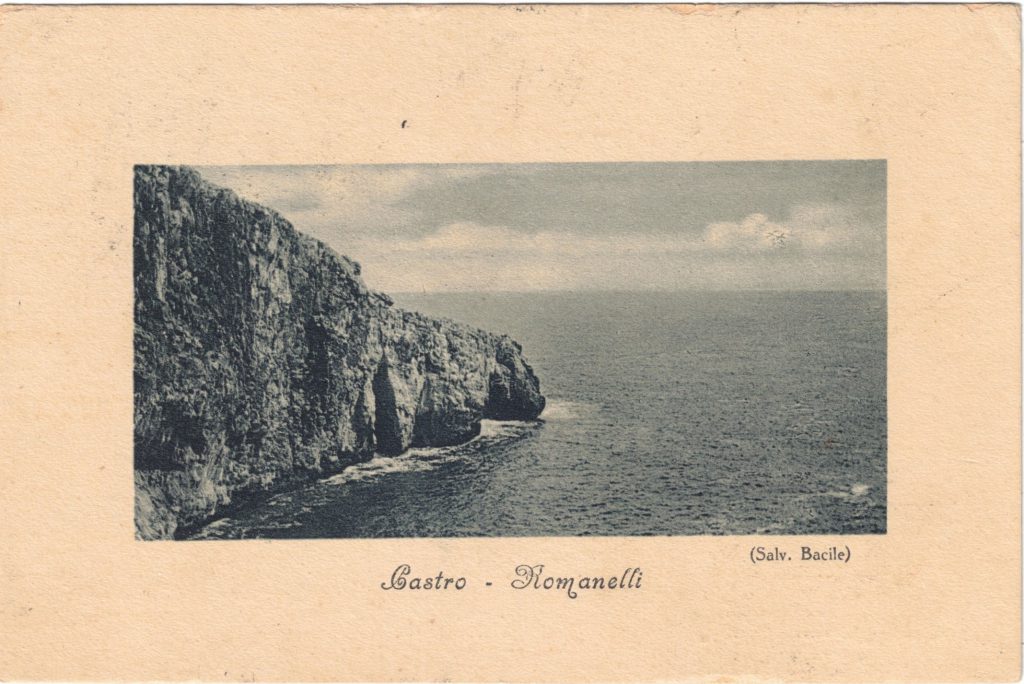
Armando Perotti and Posta Santa Croce
Some photos taken on June 17th, 1913, portray Armando Perotti and Fortunata Consiglio at Posta Santa Croce and in the surroundings, for a picnic in the countryside.
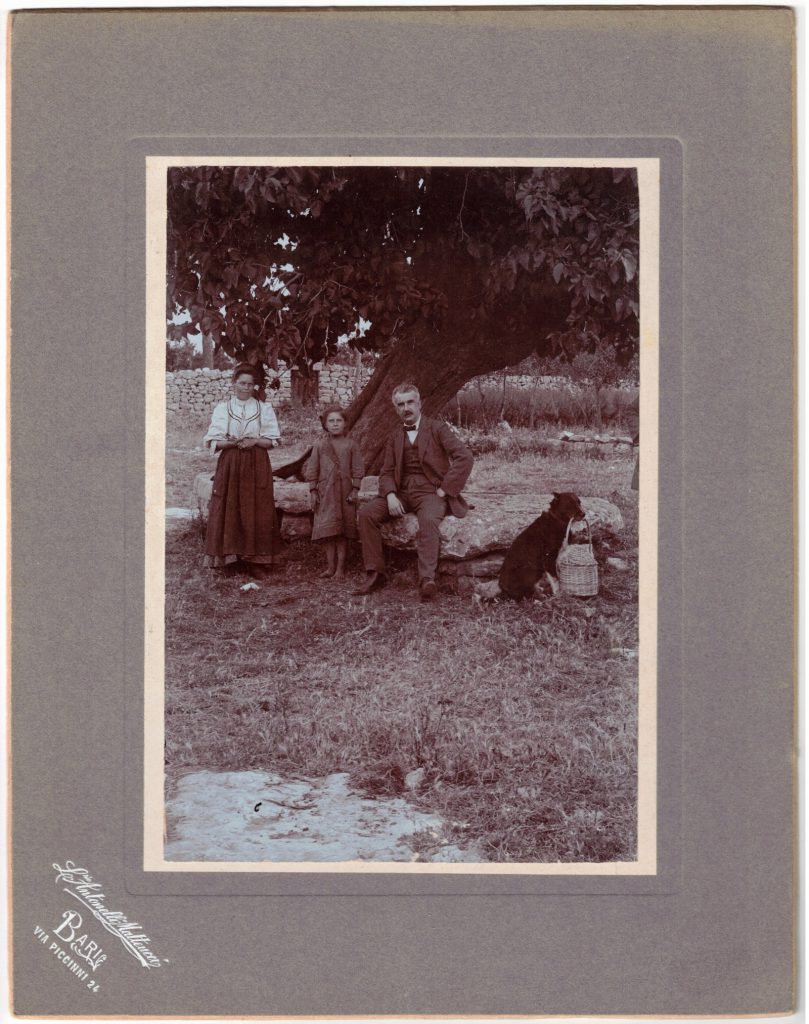

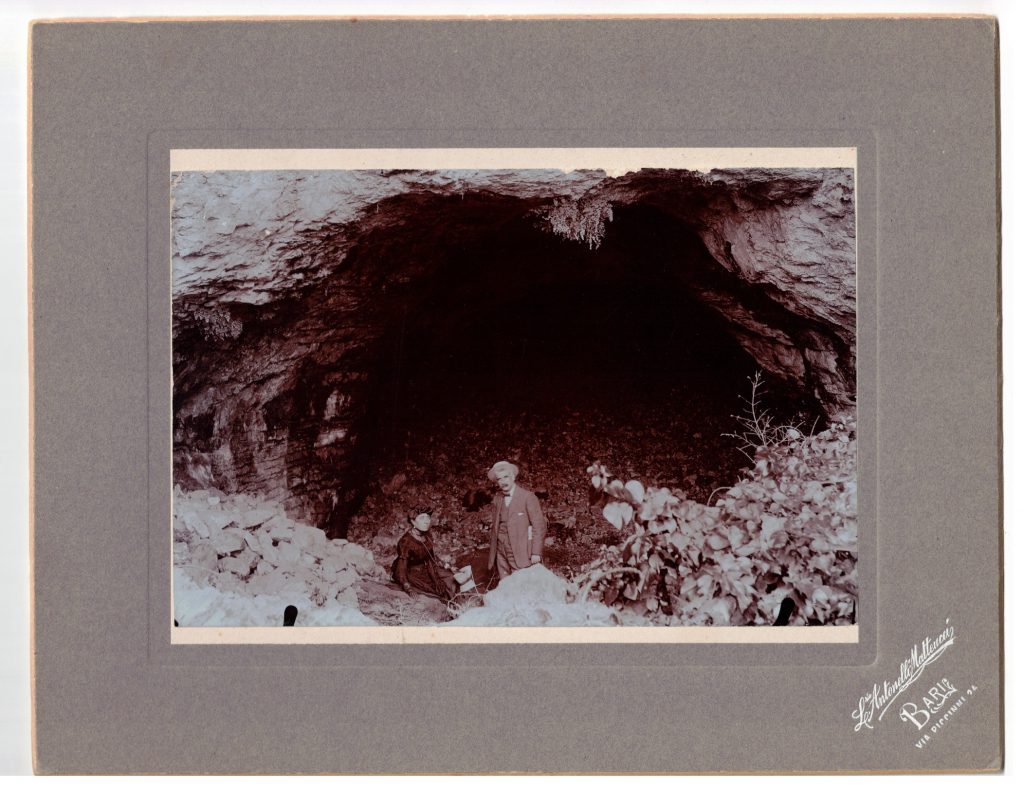
“Apulian affair”
Bari, G.Laterza & Sons, 1910, published for Perotti-Consiglio wedding
A subscription allowed the publishing of this book, which was a gift for the spouses: Benedetto Croce was among the subscribers who received a copy of the book. There’s also the Municipality of Taranto: we put it in evidence because of an anecdote we’ll tell in a while.
“As soon as they came to know of his wedding, many of Armando Perotti’s friends decided to gift him of something which not only was evidence of their deep, and for many of them, old friendship, but also a small contribution to the study of the Land of Apulia, which he sang and described with precious artistic sensitivity and patient filial love.
This is the origin of this book, written in the short time between the news of the marriage and the day set for the wedding ceremony.
May it be appreciated by our Dearest Friend, by Her who will be his life partner, by all who love Armando Perotti, appreciate his intellect, share his love for their common motherland Apulia, and contributed to the editing of this volume“.
Carlo Massa, in the preface.
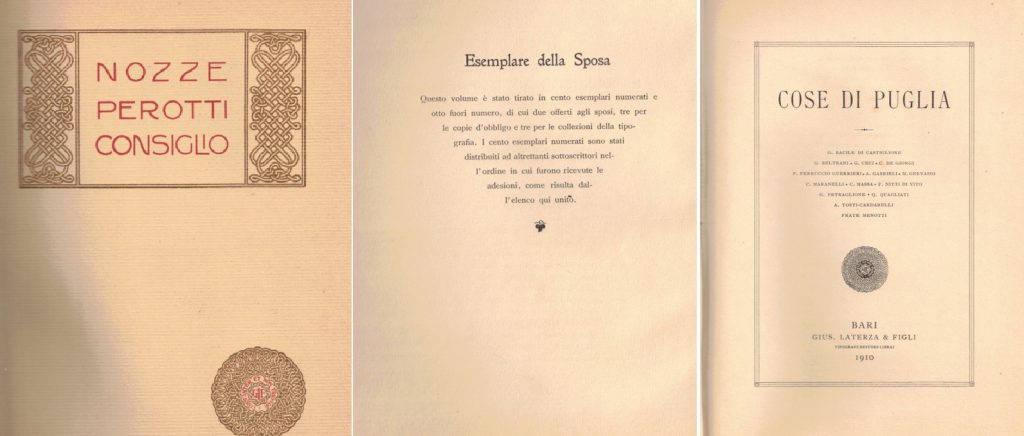
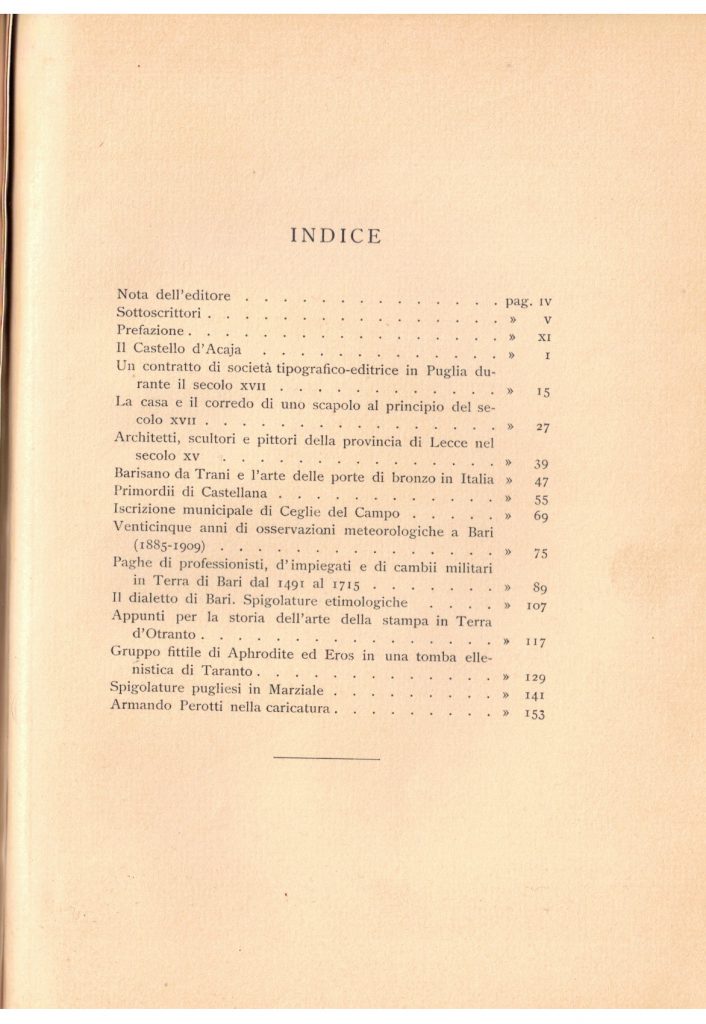
As mentioned, one copy of the book was given to the Municipality of Taranto. One year later, the British writer Norman Douglas, went to Taranto and visited the Public Library; he wrote down:
“Wandering among those shelves, I came across a recent volume (1910) which aroused my reflections more than the oldest ones. Its name is “Cose di Puglia” (Apulian affair); it contains about 12 articles, whose authors are from this area of the ancient Calabria, on issues of local interest – its history, meteorology, dialects, usual hints about the countryside, extracts from old economic treaties, notes about the development of the Apulian press, jokes on the characteristics of the place, descriptions of medieval monuments; in short, a kind of anthology of the local tradition. Printing, paper and pictures in this remarkable volume are beyond any possible praise: they would honor the best publisher in London or Paris. Che cosa è questo libro? Non è assolutamente una speculazione commerciale; è un dono di nozze a una coppia appena sposatasi – un bouquet di fiori, di boccioli intellettuali, colti e selezionati dai campi della loro natia Puglia […], una spontanea espressione di augurio da parte di qualche amico […]. What is this book? It isn’t a commercial speculation at all; it’s a wedding gift to a just-married couple – a flower bouquet, intellectual buds, picked and selected from the fields of their native Apulia […], a spontaneous expression of good wishes on the part of some friends […]. People must have the highest respect for the things of the Spirit; a gift like this is the most beautiful flowering of civilization “. (Norman Douglas, Old Calabria).
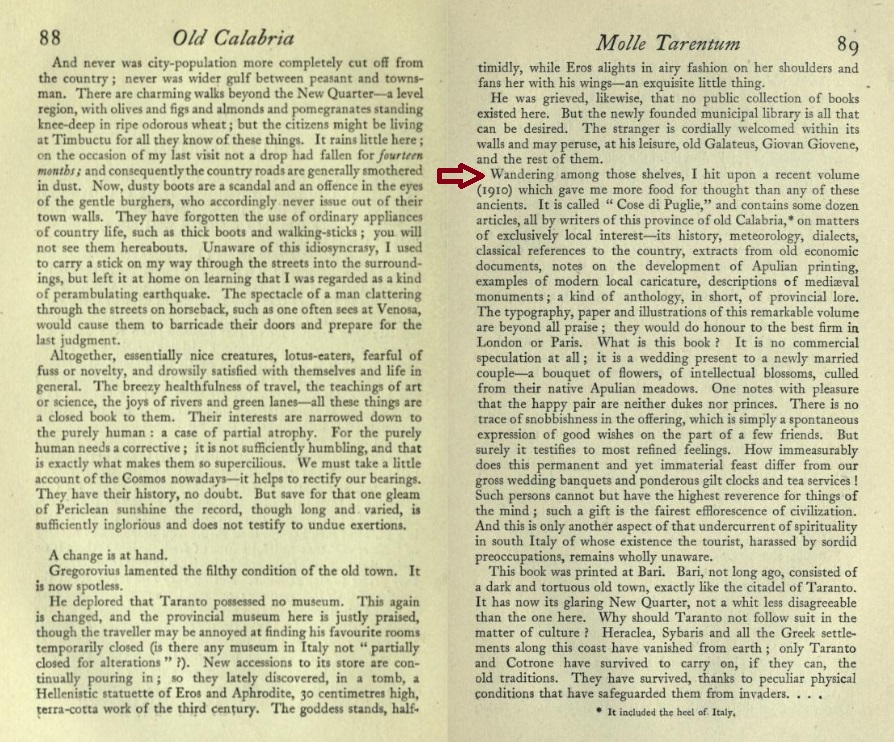
This “highest respect for the things of the Spirit” which Norman Douglas speaks about, together with Armando Perotti’s passionate plea to struggle for the safeguard of the Apulian landscape -strong and clear in his words, amazing omen of future events-, have deeply inspired us when we decided to restore our Masseria, pushing us to give it back the same appearance as it had in the photo taken on June 7th, 1913, so renouncing invasive works, that could improve the spaces but change its original image.
Both respect and plea still gently blow across the rooms at Posta Santa Croce and its surrounding meadows and fields, where here and there one can read extracts from Perotti’s poems and where we created, guided by Ovid, the Park of the Metamorphoses, paying in this way the proper tribute to the deeply classicist nature of our Man of Letters, with the metamorphic use of age-old logs burned by fire.
The same respect and appeal powerfully emerge in the “nobly uncultivated agro”, the way we stubbornly want to keep it for the most part, aware that the bursting beauty of the Apulian landscape must be kept in its rigorous authenticity without compromise.
Pietro Consiglio (Translation by Antonella Valente)
